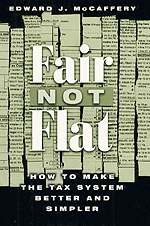Sticking it to the Tax Man
 The snow has melted, birds are chirping, and the W2s roll into the mailbox. It can only mean one thing: tax season. Many of us will grumble about how we’re paying too much, while the rich are getting off easy. But what can we do about it? What alternative is there?
The snow has melted, birds are chirping, and the W2s roll into the mailbox. It can only mean one thing: tax season. Many of us will grumble about how we’re paying too much, while the rich are getting off easy. But what can we do about it? What alternative is there?
In Fair Not Flat: How to Make the Tax System Better and Simpler, tax law expert Edward J. McCaffery proposes a straightforward and fair alternative. A "fair not flat" tax that is consistent and progressive would tax spending, not income and savings. And if it were collected at its lower levels through a national sales tax, most people would not have to file a return. A supplemental tax on spending for the wealthiest individuals would make the national sales tax progressive.
Under McCaffery’s system, a family of four would pay no tax on their first $20,000 in spending, and 15 percent on the next $60,000. Only the few families who spend more than $80,000 a year would be subject to the supplemental tax. Necessities would be taxed less than ordinary and luxury items. No one would be taxed directly on savings. The estate and gift or so-called death tax would be abolished, for the simple reason that dead people don’t spend. The "fair not flat" tax would fall on heirs when and as they spend their good fortune. Perhaps best of all, most Americans would not have to fill out tax returns. Simpler, more efficient, fairer, and more reflective of America’s current social values, McCaffery’s "fair not flat" tax could help get us out of the tax mess that politicians and special interests have gotten us into, improving the whole country in the process.
Visit Edward J. McCaffery’s Fair Not Flat Web site, which includes excerpts from the book, interviews, reviews, and other special features.
McCaffery is also the author of Taxing Women, an examination of the gender bias in tax laws and the inequalities facing married couples filing jointly. Taxing Women contributed to the movement to modify the tax code that resulted in legislation removing some but not all of the so-called marriage penalty. McCaffery explains the scope and limitations of the changes an article published on the Web site of the National Center for Policy Analysis.